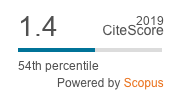The effectiveness of multiple intelligences based teaching strategy in enhancing the multiple intelligences and science process skills of junior High School students
Abstract
The study was aimed to investigate the effectiveness of teaching strategy based on Multiple Intelligences (MI) theory to improve multiple intelligences and science process skills of junior high school students in Indonesia. The study used quasi experimental design and the effectiveness of the teaching strategy was evaluated by pretest-posttest-control-group design. The samples consisted of two schools selected by Stratified Random Sampling. The experimental group (n=63) was taught using the MI strategy while the control group (n=61) was taught using the traditional strategy. This study was conducted in 12 weeks. Data were obtained from multiple intelligences test, science process skills test, and observation sheets. The hypotheses of student multiple intelligences and science process skills were tested using Wilcoxon’s Signed Rank Test and ANOVA test. The results indicated that students who were instructed by using MI strategy improved on four specific types of multiple intelligences namely visual spatial, intrapersonal, kinesthetic, and musical intelligences. However, the interpersonal logic remains unchanged, while the mathematical logic decreases after treatment. Also, these showed an improvement of the science process skills, specifically in the questioning ability.
Keywords
teaching model, multiple intelligences, science process skills
DOI: https://doi.org/10.3926/jotse.404
This work is licensed under a Creative Commons Attribution 4.0 International License
Journal of Technology and Science Education, 2011-2024
Online ISSN: 2013-6374; Print ISSN: 2014-5349; DL: B-2000-2012
Publisher: OmniaScience







